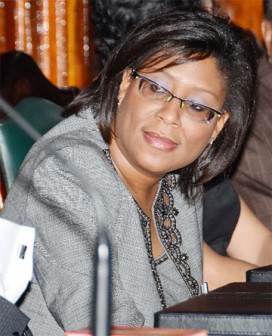Tourism Minister Cathy Hughes told the National Assembly during the second sitting of the 11th Parliament that the tourism sector is undergoing policy and other changes to fully capitalise on Guyana’s potential as an unspoilt South American destination.
The tourism sector is expected to be a huge foreign exchange earner for Guyana as its contribution to the Gross Domestic Product (GDP) has been valued at between US$64M to $220M annually or up to 8.8%. Hughes recalled too that the World Travel and Tourism Council in 2013 reported that the direct effects of traveller tourism locally amounted to some $16 billion or US$87.9Mwith a wider effect of $44 billion or 8.9% of the GDP. “These figures demonstrate the capacity of the sector to provide much needed secure jobs to the nation’s unemployed young people, which “with the requisite training is not an illusion,” she said, according to a report from the Government Infor-mation Agency (GINA).

Hughes pointed out that these expectations can only be realised when driven by a strong policy framework and as such a National Tourism Policy is already being formulated. This policy… “will identify niche markets, and areas of strategic advantage such as the exotic local bio-diversity, flora, fauna, pristine rainforest, and vast rivers with exciting potential for water sports, and waterfalls.” “Guyana’s tourism potential is just waiting on us to make it happen,” she asserted.
In keeping with this, an international marketing plan must be implemented to spread, “the existence of Destination Guyana and what she has to offer,” she said. The groundwork has already begun, starting with the rebranding of Guyana as “South America Undiscovered.” The minister was hopeful that funding would be approved for this marketing programme.
Fiscal incentives
Hughes further said the re-examination of current fiscal incentives granted to persons within the sector and the previous uneven allocations will be changed, and a level playing field created. With 70% of the local tourism sector being owned and operated by locals, the minister said most of the money earned from tourism remains in the country. She cited tax incentives, as is done in several Caricom states, as one method of giving the sector the boost that it needs. “In the Bahamas for example, the standard VAT rate is 15%, but for their tourism sector it is 10%. In Barbados, the rate is 17.5% but a concessionary rate of 7.5% is applied to the tourism industry… I hope this will be seriously considered in the upcoming 2015 budget,” Hughes said.
The minister also told the gathering that the board of the Guyana Tourism Authority will be re-established and will comprise representatives such as those from Region Nine’s accolade-winning community-based tourism providers. The Guyana Hospitality Institute in association with the Education Ministry and the Carnegie School of Home Economics will also be enhanced, she said.
Guyana’s image
Hughes noted too that the ministry hopes to increase the number of visitors though that will be difficult with the publicity given to crime in the local media. “A better balance from the media with a focus also on the “feel good success stories” would be welcomed,” she said, adding that with assistance from the security sector, the perception of Guyana as a violent country can be improved.
Expanded airlift capacity is also needed and more Guyanese must be able to enjoy the local tourism sector, the minister said. She thanked all those who have also stayed the course along with those who have contributed to the massive clean-up efforts in Georgetown and across the country. However, Hughes acknowledged “There is much more to be done. As one people, under one nation with one destiny, I say let’s get together and brighter days are indeed ahead.”





